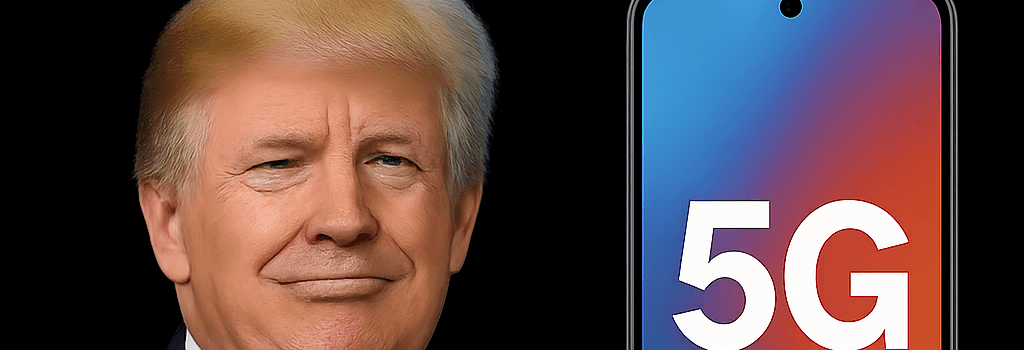Trump Mobile Launches $47.45/Month ’47 Plan’ and $499 5G Phone

On Monday, the Trump Organization officially rolled out Trump Mobile, a new American-branded wireless service. The centerpiece is “The 47 Plan,” priced at $47.45/month, alongside a pre-order announcement for the gold-colored T1 Phone—a device touted as “designed and built in the United States.”
What Is The 47 Plan?
Trump Mobile’s flagship offering, The 47 Plan, is positioned as a 5G-enabled mobile service for “customers who expect the best from their carrier.” Key elements from the press release include:
- Cost: $47.45 per month, referencing Trump as the 47th president.
- Coverage: MVNO access to “all three major U.S. 5G networks” (Verizon, AT&T, T-Mobile).
- Data: Unlimited talk, text, and data with prioritization rules similar to other major carriers.
- International Roaming: Pay-as-you-go in 210+ countries, subject to fair-use policies.
Analysts note that pricing is competitive but not disruptive. According to a recent CNET roundup, several major carriers offer equivalent unlimited 5G plans in the $40–$50 range.
Trump Mobile’s MVNO Model
Rather than building spectrum holdings or radio access networks, Trump Mobile operates as a mobile virtual network operator (MVNO). Under this model:
- Trump Mobile partners with existing networks for backhaul and cell-site access.
- The company resells service under the Trump brand, handling billing, customer service, and marketing.
“This is a classic licensing and reseller play, not a new wireless technology,” says telecom analyst Ravi Pushpakaran of MoffettNathanson.
The T1 Phone: Technical Specifications
Next on the product roadmap is the T1 Phone, a gold-finished smartphone priced at $499. Highlights from the sparse technical sheet and leaks include:
- Display: 6.1-inch AMOLED, 1080×2340 resolution, 19.5:9 aspect ratio—unusually narrow and elongated.
- Processor: Qualcomm Snapdragon 7 Gen 1 (mid-range 4 nm chip), octa-core CPU up to 2.4 GHz.
- Memory & Storage: 6 GB LPDDR4X RAM, 128 GB UFS 2.2 onboard storage (no microSD slot).
- Battery: 3,500 mAh with 25 W USB-C fast charging; Qi wireless charging not supported.
- Connectivity: 5G sub-6 GHz (bands n2, n5, n41, n66, n71), LTE Cat 18, Wi-Fi 6 (802.11ax), Bluetooth 5.2, NFC.
- Camera: Dual rear setup (48 MP wide + 8 MP ultrawide), 16 MP front shooter.
- OS: Android 13 with Trump Mobile custom launcher and pre-installed apps.
Device manufacturing is slated for Foxconn’s Wisconsin facility, though Eric Trump recently hinted on Bluesky that some components may still ship from overseas for final assembly.
Manufacturing Challenges and U.S. Sourcing
The Trump Organization’s promise of an “American-made” smartphone comes amid broader industry debate over onshoring. Relocating production to the U.S. can introduce:
- Higher labor costs, potentially 30–50% above Asian factories.
- Supply-chain bottlenecks for advanced semiconductors and display panels.
- Quality control challenges as domestic plants scale up for low-volume runs.
IDC analyst Marissa Wilkins observes,
“Without economies of scale, Trump Mobile must charge a premium or accept tighter margins. At $499, the T1 sits in the mid-tier segment dominated by Android OEMs.”
Market Position and Competitive Landscape
Apple’s iPhone 16 starts at $799, with potential price increases if production moves stateside. Yet established players like Samsung, Google, and OnePlus also offer $499 devices, backed by years of R&D:
- Brand Loyalty: Trump Mobile bets on a politically motivated base rather than mainstream adoption.
- Retail Strategy: Bloomberg reports plans for dedicated Trump Mobile stores and kiosks in select malls.
- Accessory Ecosystem: Early glimpses show co-branded chargers, cases, and power banks.
Privacy, Security, and Liability
Terms of service put customers on notice that Trump Mobile is not liable for network outages or data breaches on partner networks. Key legal caveats:
- Termination Rights: Use of the Trump trademark can be revoked, ending service without notice.
- Non-Refundable Sales: All T1 Phone pre-orders are final sale, with no price protection.
- Data Security: No affirmative commitment on end-to-end encryption or zero-trust architecture.
Cybersecurity expert Dr. Lena Martínez warns,
“Customers should scrutinize network privacy policies, especially when an MVNO delegates core security responsibilities to third parties.”
Industry Reaction and Next Steps
Stakeholders are watching closely:
- Telecom Operators may adjust MVNO pricing to retain wholesale customers.
- Device Makers evaluate U.S. assembly costs versus marketing cachet.
- Regulators assess whether politically affiliated carriers raise unique compliance issues.
The T1 Phone’s official launch window remains between August and September, with full rollout of Trump Mobile service expected by late Q3 2025.
Deeper Analysis
Supply Chain Resilience
Onshoring smartphone manufacturing forces closer scrutiny of North American semiconductor fabs. TSMC’s expansion in Arizona and Samsung’s Texas facility will influence component availability for mid-tier SoCs like the Snapdragon 7 Gen 1.
Long-Term Viability of Politically Branded MVNOs
Past cases (e.g., celebrity MVNOs) show short-lived success tied to novelty. Sustained growth hinges on network quality, customer support, and pricing agility—areas where Trump Mobile must prove itself beyond branding.
Potential for 5G Standalone (SA) Evolution
Currently reliant on Non-Standalone (NSA) 5G, Trump Mobile could partner with Open RAN initiatives or edge computing providers to differentiate on low latency and localized services.